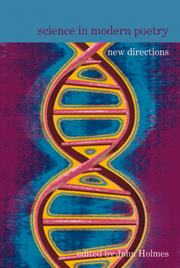Book contents
- Frontmatter
- Contents
- List of Contributors
- Acknowledgements
- Introduction
- Part I Science and Contemporary Poetry: Cross-Cultural Soundings
- Part II Science in Modernist Poetry: Appropriations and Interrogations
- Part III Darwinian Dialogues: Four Modern Poets
- 9 ‘Accidental Variations’: Darwinian Traces in Yeats's Poetry
- 10 Making the Past Wake: Anthropological Survivals in Hardy's Poetry
- 11 Reading Bishop Reading Darwin
- 12 From Bergson to Darwin: Evolutionary Biology in the Poetry of Judith Wright
- Afterword
- Bibliography
- Index
11 - Reading Bishop Reading Darwin
from Part III - Darwinian Dialogues: Four Modern Poets
- Frontmatter
- Contents
- List of Contributors
- Acknowledgements
- Introduction
- Part I Science and Contemporary Poetry: Cross-Cultural Soundings
- Part II Science in Modernist Poetry: Appropriations and Interrogations
- Part III Darwinian Dialogues: Four Modern Poets
- 9 ‘Accidental Variations’: Darwinian Traces in Yeats's Poetry
- 10 Making the Past Wake: Anthropological Survivals in Hardy's Poetry
- 11 Reading Bishop Reading Darwin
- 12 From Bergson to Darwin: Evolutionary Biology in the Poetry of Judith Wright
- Afterword
- Bibliography
- Index
Summary
Elizabeth Bishop is often celebrated as a poet's poet. John Ashbery once called her the ‘writer's writer's writer’ (1977). Such descriptions imply that Bishop was somehow born to be a poet, but that being a poet was all she could do. In her lifetime Bishop frequently bridled at sug gestions that she was aloof or ignorant of the problems of contemporary America, or indeed Brazil, where she lived for almost two decades. In an interview with Ashley Brown in 1966, she spoke of being ‘very aware of the Depression […]. After all, anybody who went to New York and rode the Elevated could see that things were wrong’ (1996, 22). While Bishop rarely worked in the so-called ‘real’ world herself, aside from the last decade of her life when she took up part-time teaching to help pay the mortgage, she was far more involved in non-literary life than most of her poetic peers. In the 1930s, for example, while still establishing herself as a poet, she considered enrolling in medical school before being talked round by Marianne Moore. Most of her friends were non-poets, including the physicist Jane Dewey, an expert in quantum optics who was rumoured to have worked on the development of the atom bomb during the Second World War. In Brazil, Bishop was on good terms with various architects and politicians, while in Key West and later San Francisco she acted as patron to at least two painters (Gregorio Valdes and Wesley Wehr).
- Type
- Chapter
- Information
- Science in Modern PoetryNew Directions, pp. 181 - 193Publisher: Liverpool University PressPrint publication year: 2012
- 1
- Cited by



